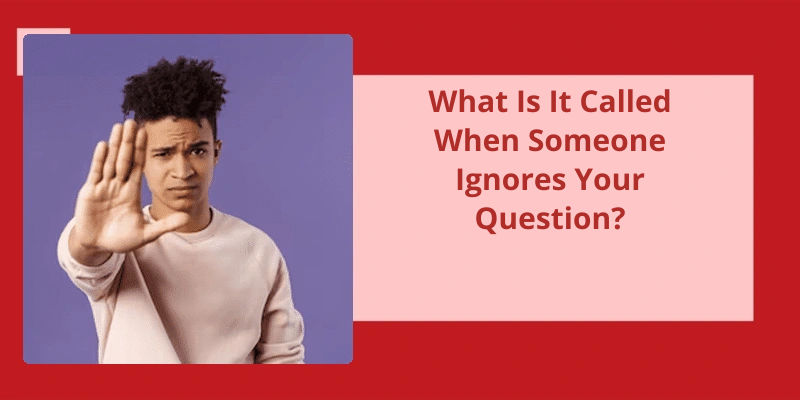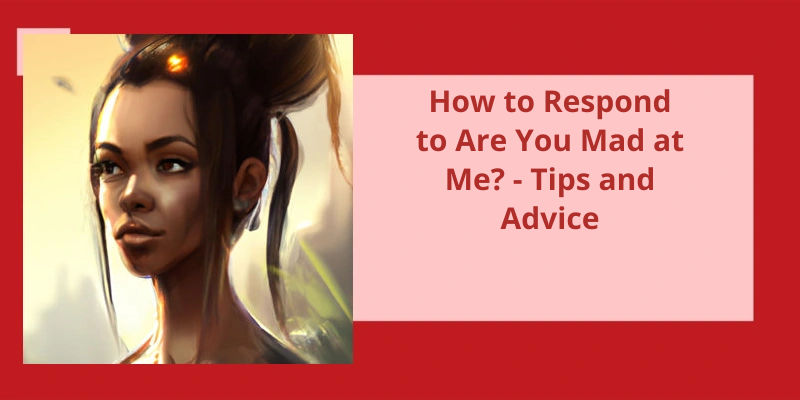Have you ever had a conversation with someone and asked them a straightforward question, only to receive a response that seemed completely irrelevant? Perhaps you asked for their opinion on a particular topic, but they responded with a tangential anecdote or changed the subject entirely. This frustrating behavior is known as question dodging, and it’s a technique commonly used in politics, journalism, and other fields where individuals may be trying to avoid revealing information or taking a stance on a particular issue. While it can be difficult to recognize when someone is purposefully avoiding a question, being able to identify and call out question dodging can be an important skill in effective communication and debate.
What to Do When Someone Ignores Your Question?
When someone ignores a question that you ask, it can feel frustrating and dismissive. It can make you feel like your thoughts and ideas aren’t important, and like the other person doesn’t care about what you’ve to say. If this happens, it’s important to take a step back and take a deep breath. Try not to get defensive or confrontational about the situation. Instead, try to approach the person calmly and respectfully.
One way to do this is by asking them directly why they keep ignoring your question. This can invite a conversation about whats going on and why theyre avoiding the topic. It’s important to phrase the question in a non-judgmental way, and to express curiosity and concern rather than anger or frustration. By doing so, youre more likely to get a thoughtful, honest response from the other person.
Additionally, it can be helpful to express how youre feeling about the situation. Let the other person know that their refusal to answer your question is hurtful or confusing. By doing so, youre opening the door to a more empathetic and understanding conversation. It can also help the other person see things from your perspective and encourage them to take your thoughts and ideas more seriously in the future.
Above all, it’s important to make sure that the other person hears you and doesn’t change the subject. If they start to deflect or ignore you again, gently redirect the conversation back to the original question. This can show the other person that youre serious about the issue and that youre not going to let them sidestep it. It can also help you get the answers and information you need to move forward in the conversation.
Of course, there may be times when the other person simply doesn’t want to answer your question. They may feel uncomfortable or defensive, or they may simply not have an answer. In these situations, it’s important to respect their boundaries and recognize that everyone has a right to their own feelings and opinions. If this happens, consider rephrasing your question or approaching the topic in a different way. By being open and flexible, you can increase your chances of having a productive and respectful conversation.
Ways to Manage Your Emotions and Reactions When You Encounter a Frustrating Situation in a Conversation
- Take a deep breath and count to 10 before responding.
- Try to understand the other person’s perspective.
- Use “I” statements instead of “you” statements to express your feelings.
- Acknowledge the other person’s emotions and validate their point of view.
- Avoid personal attacks or blaming.
- Suggest taking a break or postponing the conversation if emotions are running high.
- Practice active listening to ensure both parties feel heard and understood.
- Find common ground and focus on solutions instead of problems.
- Consider seeking the help of a mediator or therapist if necessary.
Avoiding a question can be seen as a red flag in situations that require honesty and transparency. It may indicate that the person being questioned is trying to hide something or isn’t comfortable with the topic at hand. In this article, we will delve deeper into the reasons why people dodge questions and provide tips for effectively dealing with question dodgers.
What Does It Mean When Someone Avoids a Question?
When someone avoids a question, it can be a sign that they’re either not fully confident or knowledgeable about the topic at hand. They may be hesitant to provide an answer because they don’t want to appear foolish or ignorant, which could lead to a loss of credibility or respect from their audience. In some cases, individuals may also dodge questions if they feel threatened or interrogated. This can be common in debates or interviews, where individuals may want to avoid a direct answer to maintain control of the conversation.
Question dodging can also be a strategic tactic used in negotiations or political environments. By avoiding a direct answer, individuals may be able to shift the conversation away from a topic they don’t want to address or steer it towards a more favorable outcome. This type of evasion can be especially effective if the individual is skilled at changing the subject or distracting attention away from the initial question.
In some cases, question dodging may be a sign of deceit or dishonesty. When individuals avoid answering a direct question, they may be trying to hide something or conceal information that could be damaging to their reputation or interests. This can be especially problematic in legal or ethical situations, where honesty and transparency are critical components of decision making.
Whether it’s a sign of insecurity, strategy, or dishonesty, it’s important to be aware of this behavior and understand how to navigate it effectively in different situations. So, it’s necessary to handle these situations with utmost care and understanding to identify the underlying motives for question-dodging.
The Impact of Cultural Differences on How People Respond to Direct Questions.
This topic discusses how people from different cultural backgrounds react differently to straightforward questions and how cultural differences affect their responses.
Source: What’s the word for someone who avoids answering …
It’s important to understand the characteristics of someone who avoids answering questions, as they can cause frustration and hinder the progress of discussions. Such individuals may resort to various tactics to avoid answering straightforward questions, raising suspicions and creating an uneasy atmosphere. In the following sections, we’ll delve into the various tactics and strategies that such people use, and explore ways to effectively deal with them.
What Type of Person Avoids Answering Questions?
Traits of this type of person can include a tendency to avoid direct eye contact, shifting or fidgeting in their seat, and using filler words such as “um” or “uh” when pressed for an answer. They may also try to change the subject or divert attention away from the question being asked. This behavior is often a red flag for others, indicating that they aren’t being truthful or forthcoming.
So why do some people avoid answering questions? There are many possible reasons. Sometimes, it may be because they don’t know the answer and don’t want to admit it. They may also be afraid of giving a wrong answer or revealing something that could be taken out of context. In some cases, they may simply be trying to avoid detection or scrutiny. Whatever the reason, their evasive behavior can be frustrating to those trying to get information from them.
There are many different types of people who may be evasive in their responses. Politicians, for example, are notorious for dodging questions in order to stick to their prepared talking points and avoid any controversial or potentially damaging statements. In a business setting, someone who’s evasive may be attempting to protect themselves or their company from legal or public relations fallout. In personal relationships, an evasive person may be trying to avoid conflict or protect their own emotional well-being.
Regardless of the context, dealing with someone who’s evasive can be a challenge. It’s important to remember that their behavior isn’t necessarily a reflection of you, but instead a way for them to protect themselves. One strategy for dealing with an evasive person is to try to approach the conversation in a non-threatening way, focusing on your own needs and concerns rather than trying to force them to give a specific answer. Another option is to appeal to a higher authority or expert opinion to help persuade them to be more forthcoming.
Ultimately, it’s important to recognize that some people may never be fully forthcoming or honest in their responses. While it can be frustrating to deal with an evasive person, it can also be an opportunity to practice patience, empathy, and self-care. By avoiding getting too emotionally invested in the conversation and focusing on your own needs and goals, you can help protect your own well-being and avoid being dragged into someone elses drama.
The Psychology Behind Evasiveness: What Motivates People to Avoid Answering Questions?
- The fear of judgment or negative consequences
- The desire to protect oneself or others
- A lack of knowledge or certainty on the topic
- Avoidance of conflict or confrontation
- The need for privacy or secrecy
- Avoidance of vulnerability or emotional discomfort
- The presence of guilt or shame
- A desire to maintain control or power in a situation
- Avoidance of commitment or responsibility
- The presence of anxiety or fear
When communicating with others, it’s not uncommon to encounter situations where a straightforward answer may not be warranted or possible. Sometimes, it may be necessary to avoid answering a question directly or to deflect it altogether. In such cases, there are a variety of words that can be used to describe this behavior, ranging from evasive to equivocal. Let’s explore some common synonyms for avoiding answering.
What’s Another Word for Avoiding Answering?
There are many words that can be used to describe avoiding answering a question, and each may have a slightly different connotation. Another word that can be used is “parry,” which can imply a defensive response to a tricky question. “Dodge” and “sidestep” both suggest a desire to avoid the question altogether, often by changing the subject or redirecting the conversation. In some cases, people may “balk” or “duck” a question, indicating a reluctance to engage with the topic due to discomfort or unwillingness to divulge information.
“Flannel” and “prevaricate” both imply a willingness to deceive or mislead, often by deliberately providing false or misleading information to avoid answering the question directly. There are also many words that can be used to describe more specific forms of evasive behavior, such as “stonewalling,” which refers to a refusal to engage with a question or topic altogether; “deflecting,” which involves directing the conversation away from the original topic; and “obfuscating,” which implies a deliberate effort to confuse or obscure the true answer to a question.
Common Situations Where People May Avoid Answering a Question (e.g. Job Interviews, Political Debates, Personal Relationships)
- Job interviews where the question may be seen as sensitive or inappropriate
- Political debates where the candidate may not want to reveal their stance on a controversial issue
- Personal relationships where the person may not feel comfortable divulging information
- Situations where the person feels they may be judged or criticized for their answer
- Instances where the person may not know the answer and feel embarrassed to admit it
- When the person may feel that answering the question may compromise their privacy
- When the person is feeling defensive and doesn’t want to give a straight answer
It’s a frustrating feeling when you reach out to someone with a question and don’t receive a response. While it’s easy to jump to the conclusion that the person is intentionally ignoring you, this is often not the case. There are many reasons someone may not respond, and it’s important to consider these factors before jumping to any conclusions.
Why Do People Not Respond to My Questions?
They may have missed the message altogether. The recipient might not have seen the message or maybe it was lost in their inbox. It’s common for people to receive a large volume of messages daily and sometimes they may overlook or forget to respond to a message. Another reason for not responding might be the lack of interest or relevance to the recipient. If the message doesn’t pertain to the recipient’s interest or if the content isn’t relevant to them, they may ignore or forget to respond to it.
Furthermore, social contextual factors could contribute to non-responsiveness. Cultural differences could influence a persons communication style, in some cultures it’s considered appropriate to not respond immediately or to delay the response savoring. Furthermore, when a message is sent to a group of people, some individuals might not respond under the assumption that someone else has already answered the question or contributed to the conversation.
Lastly, a persons emotional state could determine their reaction to a message. If the person is experiencing stress or anxiety, they may be more likely to overlook or forget to respond to a message. In contrast, if a person is feeling highly motivated or excited, they might respond more promptly. Additionally, if a person has experienced a high volume of messages throughout the day, they may experience inbox overload or burnout, causing them to avoid responding to messages altogether.
There can be many reasons for non-responsiveness to messages. It may range from busy schedules, cultural differences, a lack of relevance or interest, and emotional state. Sometimes, non-responsiveness might not be personal or intentional, the recipient could simply be experiencing inbox overload or burnout. Effective communication entails understanding these factors to better receive a response.
Conclusion
It’s often used by politicians during debates or interviews to evade a topic they find sensitive or uncomfortable. It’s important to recognize when question dodging is occurring and to address it in a constructive and respectful manner. By doing so, we can promote open and honest communication and prevent the spread of misinformation or ambiguity. Ultimately, understanding the use and impact of question dodging can lead to stronger relationships and a more informed society.






